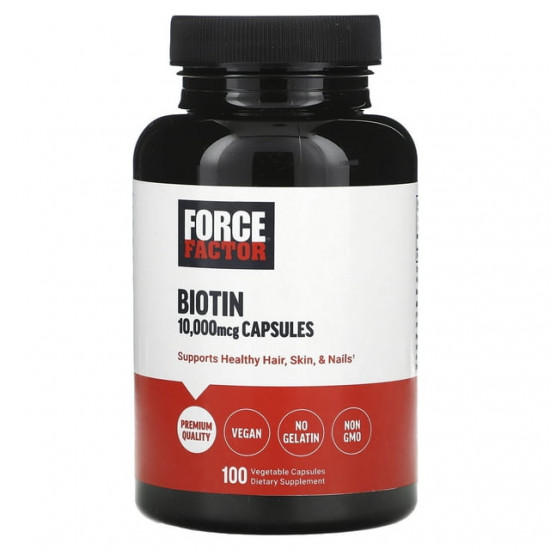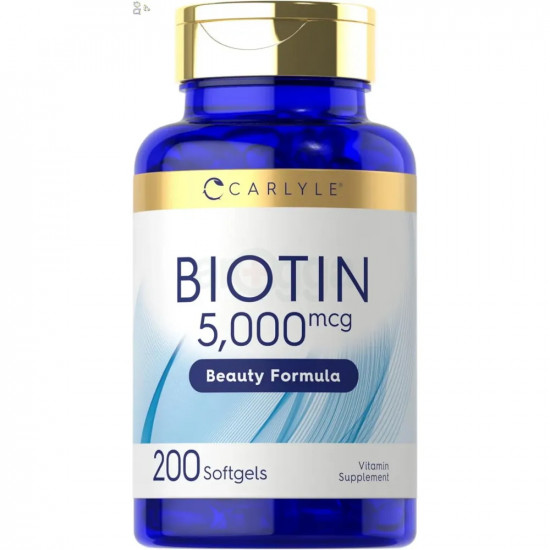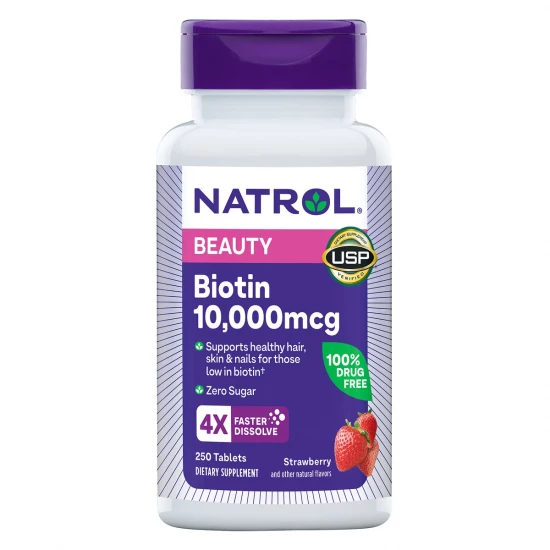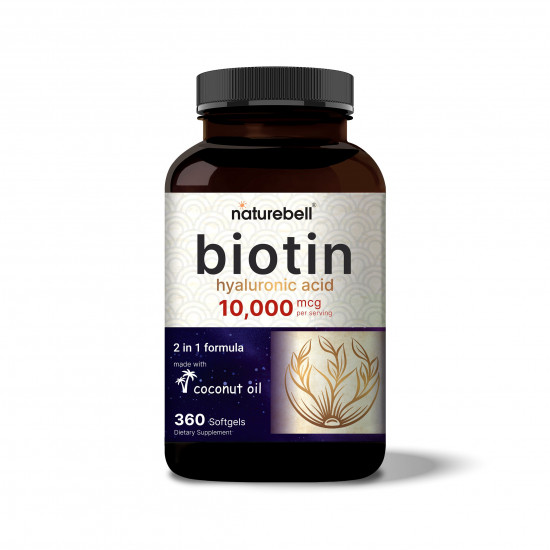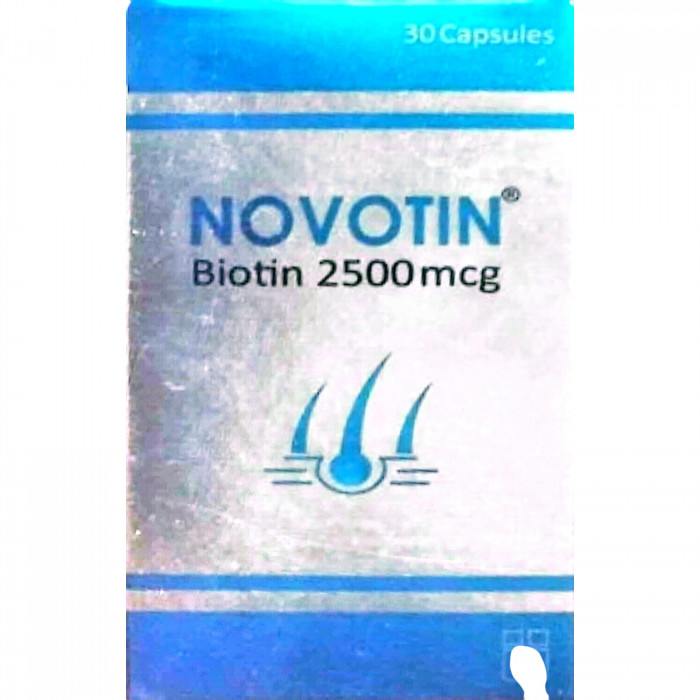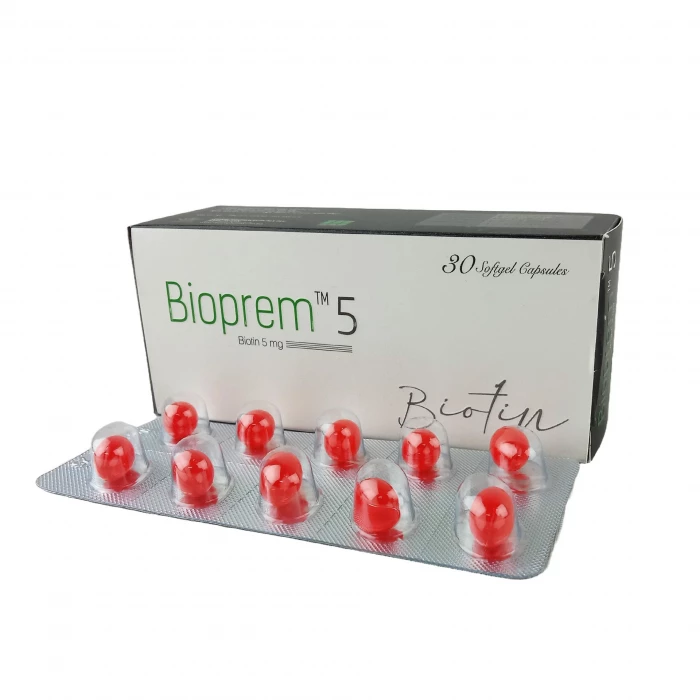
✔ 100% Authentic Product
👁️ Currently Viewing 4661
Bioprem 2.5mg Softgel Capsule 10pcs
Biotin is a vital nutrient that your body cannot produce sufficiently on its own, necessitating intake from dietary sources or supplements. It is best obtained through diet.
Biotin aids your body in:
- Converting food into energy
- Regulating cellular signals
- Managing gene activity
Biotin is present in many common foods and is mainly stored in the liver.
Discount
Price: ৳ 238
MRP:
৳
250
5%
Off

100% Genuine Products, Guaranteed

Safe & Secure Payments, Always

Fast, Secure & Efficient Delivery

Proper Packaging
 Cash on Delivery - All over Bangladesh
Cash on Delivery - All over Bangladesh Regular Delivery - 12-24 Hours, Dhaka City* Charge Tk.39-59
Regular Delivery - 12-24 Hours, Dhaka City* Charge Tk.39-59 Regular Delivery - 24-48 Hours, Other Cities* Charge Tk.99-110
Regular Delivery - 24-48 Hours, Other Cities* Charge Tk.99-110
🌙 রমযান অফার 🌙
 ফ্রি ডেলিভারিঃ - ৭৯৯ টাকা+ অর্ডারে, ঢাকা
শহরে
ফ্রি ডেলিভারিঃ - ৭৯৯ টাকা+ অর্ডারে, ঢাকা
শহরে ফ্রি ডেলিভারিঃ - ২৭৯৯ টাকা+ অর্ডারে, ঢাকার
বাহিরে
ফ্রি ডেলিভারিঃ - ২৭৯৯ টাকা+ অর্ডারে, ঢাকার
বাহিরে
📲 মোবাইল অ্যাপ অর্ডারে সাশ্রয় বেশী
-
Google Play Store থেকে ডাউনলোড
-
Apple Store থেকে ডাউনলোড
100% Genuine Products, Guaranteed
Safe & Secure Payments, Always
Fast, Secure & Efficient Delivery
Proper Packaging
 Cash on Delivery - All over Bangladesh
Cash on Delivery - All over Bangladesh Regular Delivery - 12-24 Hours, Dhaka City* Charge Tk.39-59
Regular Delivery - 12-24 Hours, Dhaka City* Charge Tk.39-59 Regular Delivery - 24-48 Hours, Other Cities* Charge Tk.99-110
Regular Delivery - 24-48 Hours, Other Cities* Charge Tk.99-110 ফ্রি ডেলিভারিঃ - ৭৯৯ টাকা+ অর্ডারে, ঢাকা
শহরে
ফ্রি ডেলিভারিঃ - ৭৯৯ টাকা+ অর্ডারে, ঢাকা
শহরে ফ্রি ডেলিভারিঃ - ২৭৯৯ টাকা+ অর্ডারে, ঢাকার
বাহিরে
ফ্রি ডেলিভারিঃ - ২৭৯৯ টাকা+ অর্ডারে, ঢাকার
বাহিরে- Google Play Store থেকে ডাউনলোড
- Apple Store থেকে ডাউনলোড
🌙 রমযান অফার 🌙
📲 মোবাইল অ্যাপ অর্ডারে সাশ্রয় বেশী
✅ Description:
Biotin, also known as vitamin H or B7, is a water-soluble vitamin that aids the body in metabolizing fats, carbohydrates, and proteins. It also supports a healthy nervous system, nails, hair, and skin.
✔️ Health Benefits
Biotin plays a crucial role in several bodily functions, including:
- Metabolizing fats, carbohydrates, and proteins
- Acting as a coenzyme for carboxylase enzymes, which are involved in:
- Creating fatty acids
- Synthesizing amino acids isoleucine and valine
- Generating glucose through gluconeogenesis
✔️ Quick Suggestions:
- Biotin, or vitamin B7, is needed to metabolize fats, carbohydrates, and protein.
- Deficiency can lead to hair loss and skin problems, but it is rare.
- Dietary sources include red meat, eggs, seeds, and nuts.
- Supplements are unlikely to cause harm, but they are not proven to help with hair, skin, and nail health.
✔️ Maintaining a Healthy Pregnancy
Approximately half of pregnant women in the United States have a mild biotin deficiency, which can affect fetal development. Folic acid supplements are recommended before and during pregnancy, and it is advisable to take a multivitamin with at least 30 micrograms (mcg) of biotin daily to prevent deficiencies.
✔️ Nails, Hair, and Skin
Biotin supplements can be taken alone, as part of a B-vitamin complex, or in a multivitamin. Some cosmetic manufacturers claim that biotin can strengthen nails and improve hair and skin health, though scientific evidence is limited and often outdated. A 2015 study indicated that women with thinning hair saw reduced shedding after taking an oral marine protein supplement for 90 days, but biotin was only one component, and the research was funded by a company selling health products. More research is needed to substantiate these claims for healthy individuals.
✔️ Lowering Blood Glucose
Studies have explored biotin's potential to lower blood glucose in individuals with type 1 and type 2 diabetes. Some research suggests biotin may stimulate insulin secretion and help control blood sugar levels, but more studies are required for confirmation.
✔️ Managing Neuropathy
Biotin is essential for pyruvate carboxylase activity. A deficiency can lead to elevated levels of pyruvate and aspartate, negatively affecting the nerves. Biotin may help reduce nerve damage in diabetes patients or those on dialysis for kidney disease. Limited studies, including a 1990 study where participants took high doses of biotin for 1-2 years, showed symptom improvement. A 2021 study suggested biotin might help with neuropathic pain, but it was based on animal models.
✔️ Biotin-Responsive Basal Ganglia Disease
This rare inherited disorder affects the nervous system, causing involuntary muscle tension, rigidity, and weakness. Treatment with thiamine and biotin has shown a positive response.
✔️ Treating Multiple Sclerosis
High-dose biotin therapy might improve symptoms in multiple sclerosis (MS) patients.
✔️ Daily Biotin Intake
Most people get sufficient biotin from their diets, so there is no established recommended daily allowance. However, adequate intake (AI) levels ensure nutritional sufficiency:
- Infants (0-6 months): 5 mcg
- Infants (7-12 months): 6 mcg
- Children (1-3 years): 8 mcg
- Children (4-8 years): 12 mcg
- Children (9-13 years): 20 mcg
- Teens (14-18 years): 25 mcg
- Adults (19+ years): 30 mcg
- Pregnant individuals: 30 mcg
- Breastfeeding individuals: 35 mcg
The average person in Western populations consumes 35-70 mcg of biotin daily through diet. For most people, a supplement is unnecessary if they eat a varied diet.
✔️ Biotin Deficiency
Biotin deficiency is rare because it is widely available in foods and can be synthesized by gut bacteria. Symptoms include:
- Hair loss (alopecia)
- A scaly, red rash around the eyes, nose, mouth, and genitals
- Depression
- Lethargy
- Hallucinations
- Numbness and tingling in hands and feet
- Loss of bodily movement control (ataxia)
- Seizures
- Weakened immune function
- Increased risk of bacterial and fungal infections
✔️ Risk Factors for Biotin Deficiency
Biotin deficiency is more likely during pregnancy, with prolonged intravenous nutrition, in infants consuming low-biotin breast milk, individuals with inflammatory bowel disease or other gastrointestinal disorders, and smokers. It may also affect those using epilepsy medications like phenobarbital, phenytoin, or carbamazepine, and individuals with liver disease.
✔️ Biotinidase Deficiency
Biotinidase deficiency is a genetic metabolic disorder where the body lacks the enzyme needed to release biotin from dietary proteins or cellular turnover. Approximately 1 in 60,000 newborns have either profound or partial biotinidase deficiency, with less than 10% or 10-30% of normal enzyme activity, respectively.
✔️ Interaction
Anticonvulsant drugs may lower plasma levels of Bioprem. Antibiotics may reduce the contribution of Bioprem by the microflora of the large intestine. Excessive consumption of raw egg whites can interfere with Bioprem absorption.
✔️ Contraindications
Bioprem is contraindicated in patients with known hypersensitivity to any of its ingredients.
✔️ Side Effects
Bioprem is well-tolerated at the recommended dose. No toxicity has been reported in individuals taking up to 200 mg orally or 20 mg intravenously per day.
✔️ Pregnancy & Lactation
There is insufficient clinical data on the use of Bioprem in pregnant and lactating women.
✔️ Storage Conditions
Store in a cool, dry place, away from light and moisture. Keep out of reach of children.
⚠️Disclaimer:
At ePharma, we’re committed to providing accurate and accessible health information. However, all content is intended for informational purposes only and should not replace medical advice from a qualified physician. Please consult your healthcare provider for personalized guidance. We aim to support, not substitute, the doctor-patient relationship.







